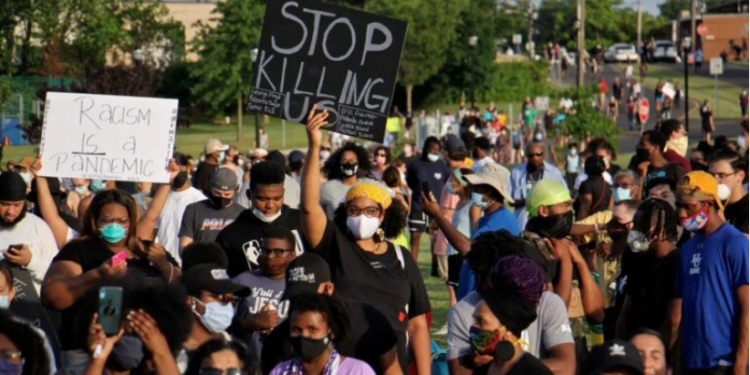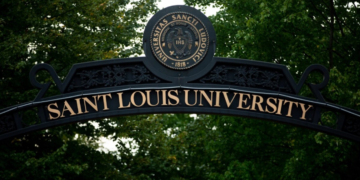This June 2020 photo captures hundreds gathering at Pennsauken Community Rec Center in Pennsauken, N.J., for a march and vigil honoring George Floyd and others killed by police. (Emma Lee/WHYY)
June 22, 2024 Story by: Editor
Over the past year, the New Jersey Reparations Council has delved into the case for reparations in the state. On Juneteenth, they presented unsettling findings about the deep entrenchment of slavery in New Jersey’s history.
One committee’s research highlighted that slavery was integral to all facets of New Jersey’s economy, impacting sectors such as agriculture, land clearing, road construction, shipping, mining, and meal preparation.
Another committee revealed that every church denomination in New Jersey was involved in and benefited from slavery.
“Here’s the liberating gospel,” said Rev. Charles Boyer, pastor of Greater Mt. Zion A.M.E. Church in Trenton. “While these institutions were oppressing Black folks both theologically and institutionally, Black faith emerged as a form of resistance. Black individuals reinterpreted the Bible and established Black-led institutions run by abolitionists, which became stations on the Underground Railroad.”
The New Jersey Institute for Social Justice (NJISJ) shared these findings at an event titled “The Promise of Juneteenth: NJ Reparations Council Year One,” moderated by New Yorker journalist and Dean of the Columbia Journalism School, Jelani Cobb.
The Reparations Council comprises nine committees focusing on various aspects, including the History of Slavery in NJ, Public Education & Narrative, Economic Justice, Segregation in New Jersey, Democracy, Public Safety & Justice, Health Equity, Environmental Justice, and Faith & Black Resistance.
These committees are investigating New Jersey’s history and formulating strategic policies to address the lasting impacts of slavery.
These committees have conducted extensive research, gathered community anecdotes, and held public information sessions. Five of them discussed their work at the NJPAC Juneteenth event, addressing the question, “What have we learned so far, and where are we going?”
Leslie Alexander’s committee examined the history of slavery in NJ. She emphasized that enslaved individuals were crucial to various industries and had a profound impact on the local economy.
“It is important to remind people that Black people remained enslaved in New Jersey after the Civil War concluded,” said Alexander, the Dr. Martin Luther King Jr. professor of History at Rutgers University-Newark. “New Jersey was the last northern state to pass any kind of emancipation act, which was gradual and required slavery to be phased out over time.”
Alexander noted that it was compensated for abolition, meaning enslavers were paid by the state with tax dollars.
Boyer’s committee on faith and Black resistance explored the faith-based justification for slavery. He pointed out that religious institutions not only developed doctrines that morally justified slavery but also engaged in the sale of slaves to support their institutions and seminaries.
He asserted that religious organizations should undergo forensic audits to uncover the extent of their economic benefits from slavery.
Boyer suggested that reparations might take the form of endowments or historical preservation efforts for Black institutions that emerged to counter racist theology and have taken on the role of caretakers for the enslaved and their descendants.
Denise Rodgers’ committee focused on health equity, noting improvements in healthcare but emphasizing that these improvements are not equitably distributed.
Rodgers, the vice chancellor for Interprofessional Programs at Rutgers University, highlighted that the first comprehensive report on health disparities, released in 1984, blamed Black people for their mortality without addressing the role of racism and its impact on social determinants of health.
“Whenever you talk about social determinants, you must also talk about structural racism,” Rodgers said, noting the lack of universal healthcare due to racism.
Rutgers Law School-Newark professor and director of the Center on Law, Inequality, and Metropolitan Equity, David Troutt, discussed New Jersey’s systemic segregation, facilitated by housing and educational policies.
He explained that this segregation underwrites the racial wealth gap, educational disparities, and public health outcomes, requiring meticulous analysis akin to contact tracing.
Alexis Karteron, representing the Public Safety and Justice Committee, explained how her team linked the history of slavery in New Jersey to current public safety and justice disparities. They examined the criminal justice system, including mass incarceration and its ties to forced labor, probation methods, and the high-profit carceral system. They also uncovered historical precedents for surveilling Black communities, such as the Fugitive Slave Act and vagrancy laws from the Jim Crow era, which persist today.
Karteron stated that her committee is still gathering documentation to support the case for reparations.
Ryan Haygood, president, and CEO of the NJISJ, said, “Part of what reparations compels us to do is to think about not just reducing harm to Black people, but how might we build a new New Jersey in which Black people are truly free to win and to thrive. That is what inspired me to create the New Jersey Reparations Council.”
Source: mosaic

















